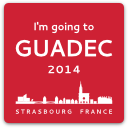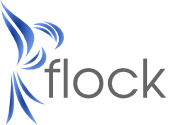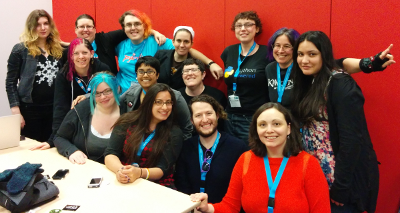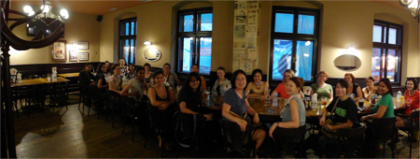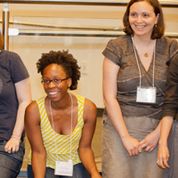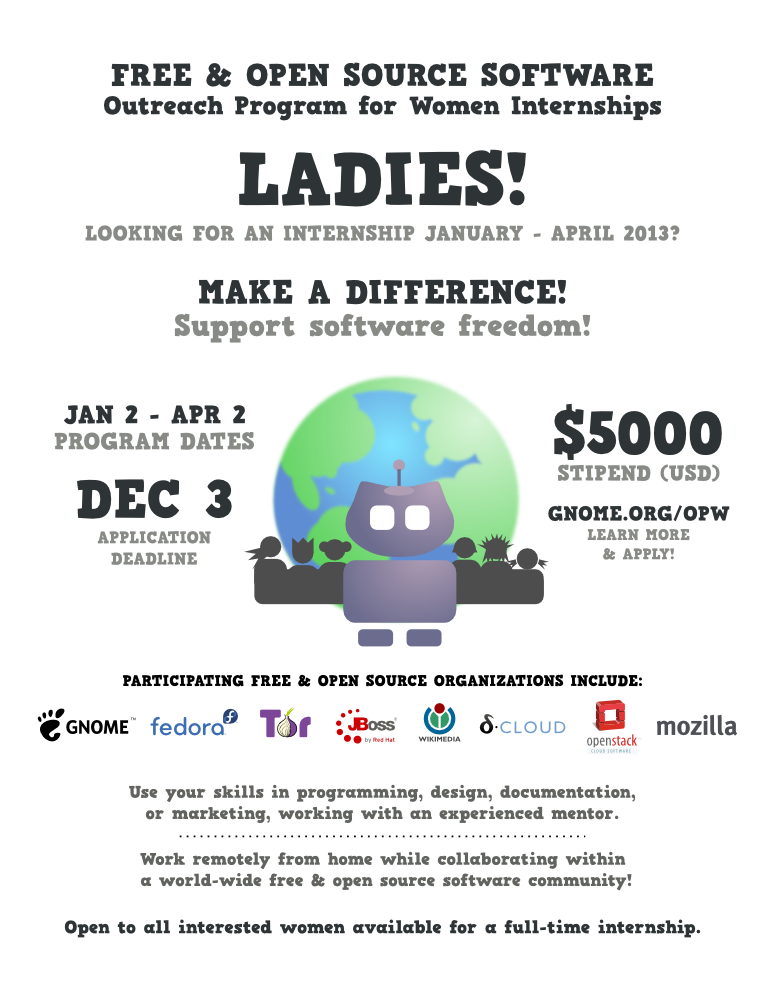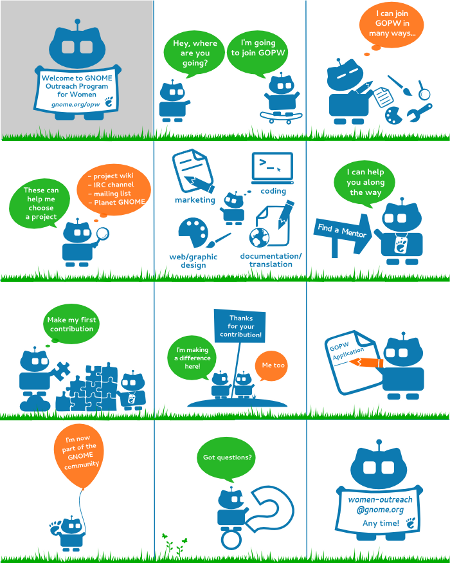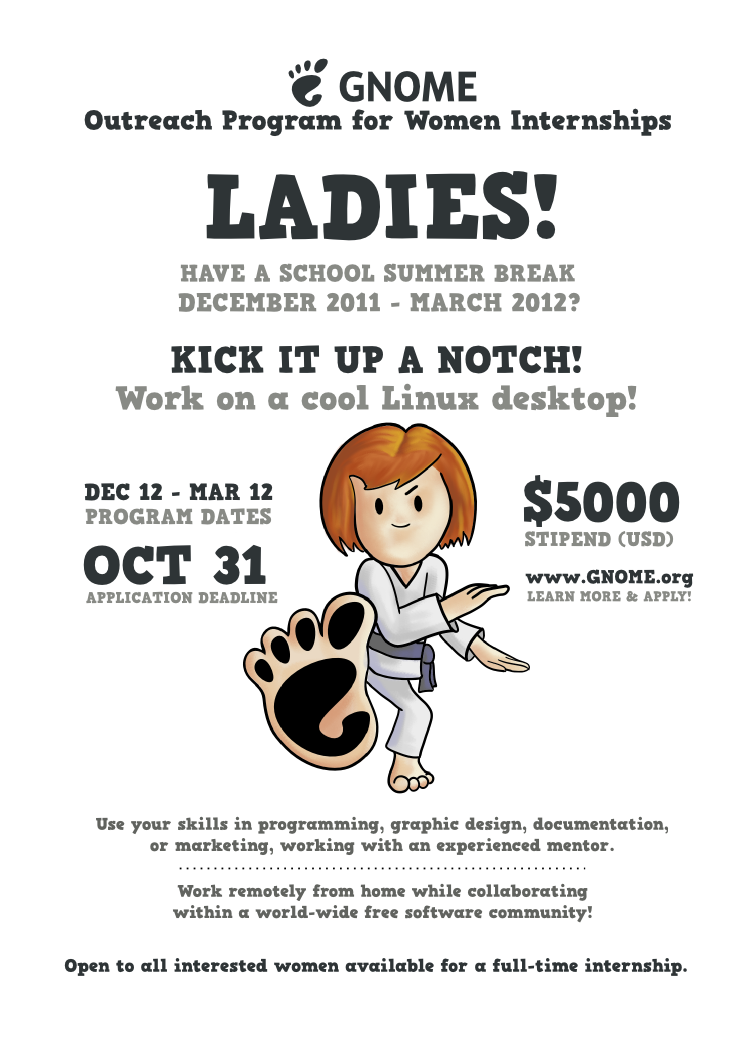We recently opened the application process for the new round of GNOME Outreach Program for Women internships. We already have 15 projects participating in the outreach effort, but it would be great to have more projects on board. As a mentor, you would help the applicants who select your project make a first contribution by October 31. An initial contribution is a required part of the application process. Then, if you get a strong applicant for your project who is accepted, you would guide her in her contributions to your project from December 12 to March 12.
Unlike what is considered typical for Google Summer of Code projects, you don’t need to come up with an idea for a stand-alone project for your intern. Instead, we’d like the interns to start with smaller tasks (i.e. bugs) and progress over time to more complex tasks (i.e. features), with each task being suggested by you based on the current priorities of your team. Ensuring that the interns work on manageable and relevant tasks helps with the important goal of getting their work incorporated into the projects during the internship period.
Having your project listed among the participating projects might help bring in a new contributor this round or at some later point. We encourage women interested in contributing to contact mentors for the participating projects at any time during the year. So please add your project now!
Just how awesome were the interns in our last round? Here is a summary of their impressive accomplishments. Thanks to them and to their mentors for making it such a successful round!
We had 8 Outreach Program for Women interns.
Aline Duarte Bessa wrote new topic-based help for Accerciser, an interactive tool that allows GNOME applications to check what accessibility information they are providing. She wrote documentation for the Assistive Technology Service Provider Interface (AT-SPI), which is used to provide a description of an application to accessibility tools. She examined the entire Accerciser bug list, provided feedback on all the bugs, and created patches for many of them. She also wrote a demo widget that explored accessibility issues. [1, 2, 3, 4]
Meg Ford created 81 new icons and edited 241 existing icons. Along with the Symbolic theme icons, they complete the High Contrast and High Contrast inverse themes for GNOME. [1, 2]
Ekaterina Gerasimova wrote new topic-based help for the Vinagre remote desktop viewer and Brasero CD/DVD burner. She also was one of the key organizers of the Desktop Summit in Berlin. [1, 2, 3]
Julita Inca wrote new topic-based help for the Cheese webcam application and some general desktop help. [1, 2]
Yu Liansu created a comprehensive GNOME Visual Identity portfolio, including a lot of original art work, posters, brochures, presentation and web page templates. [1, 2, 3]
Priscilla Mahlangu added a Zulu translation for GNOME, translating over 35 core modules. [1]
Anita Reitere created guidelines and compiled resources for writing better help and for starting to contribute to GNOME documentation. She also wrote a detailed analysis of Empathy help. [1, 2, 3]
Kelly Sinnott wrote new topic-based help for GNOME System Monitor and some general desktop help. She identified the need to provide GNOME help on mobile devices and created a prototype website. [1, 2, 3, 4]
We also had 7 Google Summer of Code interns, who were encouraged and supported by the Outreach Program for Women.
Tiffany Antopolski wrote a contact chooser for collaborative viewing of documents in Evince. She also wrote some general desktop help. [1, 2]
Tamara Atanasoska improved the Anjuta IDE integration with version control system operations and implemented opening an included file by clicking on the include statement. [1, 2]
Neha Doijode implemented correctly removing message sources from the message tray and showing images in notifications in GNOME Shell. [1]
Nohemi Fernandez implemented a full-featured on-screen keyboard for GNOME Shell. [1]
Raluca Elena Podiuc added the ability to create an avatar in Empathy with a webcam or to select an avatar from standard or previously used avatars. She also added support for video effects when using video chat in Empathy. [1, 2, 3, 4]
Srishti Sethi created 6 activities for children to discover Braille for GCompris educational software. [1]
Madhumitha Viswanathan added Google Calendar, Google Tasks and Tracks backends to the Getting Things GNOME! task management software. [1]
In addition to their contributions, many of the interns participated in GNOME events. Julita, Kelly, and Tiffany attended the Open Help conference and GNOME Documentation hackfest in Cincinnati. Ekaterina, Julita, Anita, Tiffany, Tamara, Raluca, Srishti, and Madhumitha attended the Desktop Summit in Berlin. Meg, Tiffany, and Nohemi are coming to the Montreal Summit. The new participants and their contributions are definitely energizing the GNOME project!
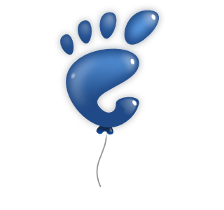 If you can’t attend one of the workshops, you can install the available image in a virtual machine and go through the newcomers tutorial used at the workshop on your own. You can ask any questions you have on IRC.
If you can’t attend one of the workshops, you can install the available image in a virtual machine and go through the newcomers tutorial used at the workshop on your own. You can ask any questions you have on IRC.